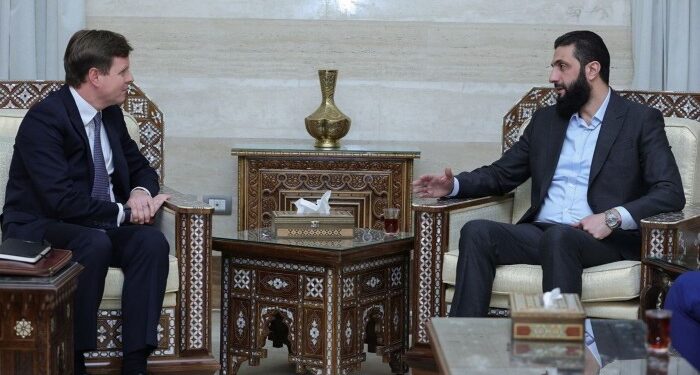Access the Editor’s Digest without charge!
Every week, Roula Khalaf, Editor of the Financial Times, curates her top stories in this insightful newsletter.
In a significant shift, Syrian rebel groups that played a pivotal role in overthrowing Bashar al-Assad are now planning to dissolve their military factions to establish a unified army. This strategic move aims to strengthen their grip on governance across the country, as announced by the leader of the most influential rebel faction.
Abu Mohammed al-Jolani, who today prefers his birth name, Ahmed al-Sharea, leads Hayat Tahrir al-Sham (HTS). He confirmed that their fighters will integrate into an army overseen by the Ministry of Defence. “We need to embrace a mindset befitting a nation, not merely opposition,” Jolani emphasized.
During a dialogue with leaders from Syria’s Druze community, he highlighted the importance of unity, asserting, “A social contract must exist between the state and all sects to uphold social justice.”
This restructuring partly aims to alleviate the constraints placed on HTS, an Islamist organization previously linked to al-Qaeda, which is still classified as a terrorist group by the US and EU. Such labels, experts warn, could hamper their aspirations to rejuvenate a country ravaged by years of conflict.
Despite this, Western countries have made overtures to HTS recently. Representatives from France, Germany, and the UK arrived in Damascus to engage with the new leaders, and the US has also established direct lines of communication with HTS.
In a noteworthy development, Turkey and Qatar have announced plans to reopen their embassies after more than a decade of closure during Assad’s reign. Turkey, which has historical ties with HTS, has consistently supported the rebels.
Jolani also announced the cessation of the much-dreaded forced conscription and plans to disarm civilians, ensuring that only the official army is armed.
Security concerns loom large following Assad’s downfall, who claimed his regime was the sole guarantor of stability and minority protection.
HTS faces a daunting challenge. Though they have controlled only a fragment of the country historically, their focus must swiftly shift to safeguarding highways and communities beyond the main urban centers.
To tackle immediate security needs in the capital, the newly established Ministry of Interior announced on Monday that it is recruiting for Damascus’s police department.
In recent days, the presence of police on Damascus streets has been minimal, with former forces dissipating in the wake of Assad’s regime collapse. Observations by the Financial Times revealed that the police on patrol sport insignias from HTS’s stronghold in Idlib.
Additional insights provided by Richard Salame in Beirut.

















